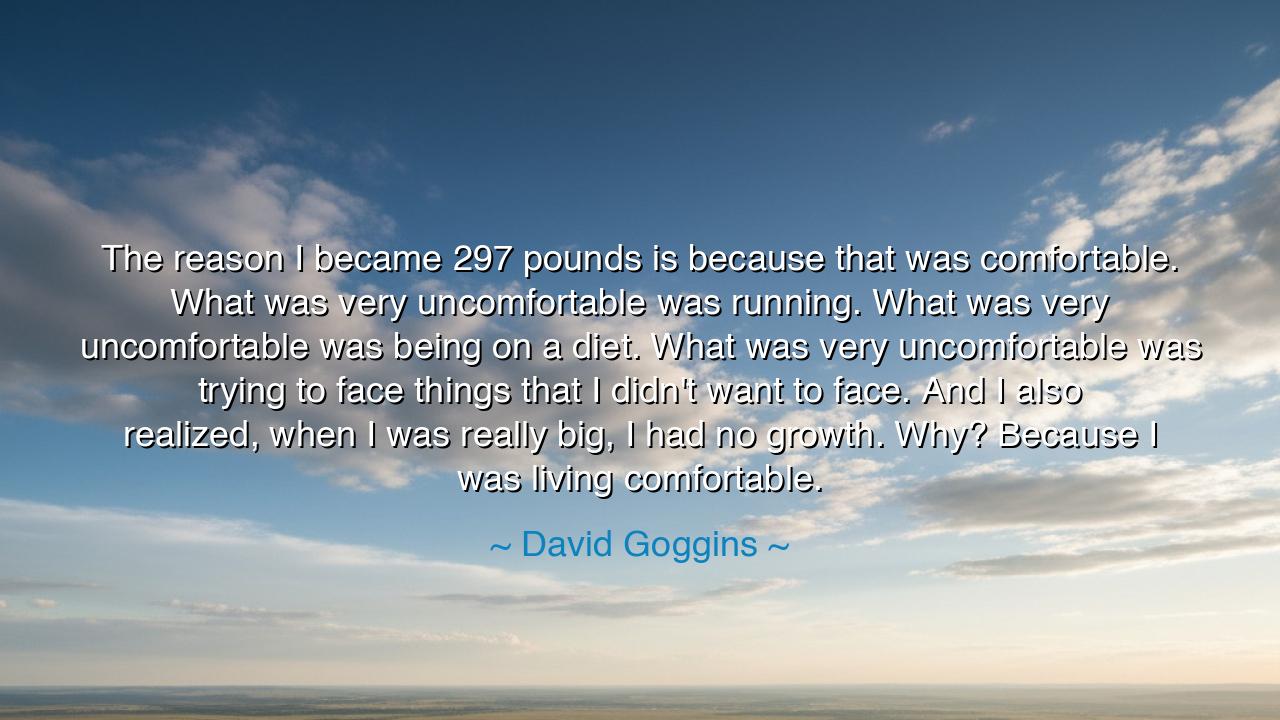
The reason I became 297 pounds is because that was comfortable.
The reason I became 297 pounds is because that was comfortable. What was very uncomfortable was running. What was very uncomfortable was being on a diet. What was very uncomfortable was trying to face things that I didn't want to face. And I also realized, when I was really big, I had no growth. Why? Because I was living comfortable.






In the words of David Goggins, “The reason I became 297 pounds is because that was comfortable. What was very uncomfortable was running. What was very uncomfortable was being on a diet. What was very uncomfortable was trying to face things that I didn’t want to face. And I also realized, when I was really big, I had no growth. Why? Because I was living comfortable,” there resounds a truth as ancient as the human soul itself: that comfort is the enemy of greatness. These are not the words of mere fitness, but of rebirth—the testimony of a man who confronted his own weakness and found strength through suffering. In this confession lies a lesson for all generations: that to live always at ease is to die slowly, and that only through struggle, discipline, and discomfort does the spirit awaken to its fullest power.
To be “comfortable,” as Goggins says, is not to live in peace—it is to live in stagnation. For comfort is the sweet poison of the modern world. It whispers to the body, “Rest here, you have done enough,” even when the heart cries out for transformation. The ancients, too, feared this false peace. The philosopher Seneca warned that “soft living weakens the mind,” while Sparta’s warriors raised their children not on luxury, but on hardship, that they might grow resilient and unyielding. Goggins, like a modern Stoic or Spartan, teaches that to escape comfort is to reclaim life itself. His weight—297 pounds—was not just flesh, but a symbol of spiritual heaviness, the burden of avoidance and fear that accumulates when one refuses to face pain.
In saying “what was very uncomfortable was running… being on a diet… facing things I didn’t want to face,” Goggins unveils the truth that transformation begins not with desire, but with courage—the courage to confront pain. The ancient athletes of Olympia trained under the burning sun, their bodies honed through exhaustion and sweat, because they knew that the body mirrors the soul: what is forged through hardship becomes unbreakable. The one who flees discomfort also flees his destiny, but the one who walks willingly into the fire emerges purified. Goggins, once broken by fear, found in discomfort not torment, but rebirth. His suffering became the furnace of his strength.
Consider the legend of Heracles, the greatest of the Greek heroes. When he stood at the crossroads of life, two goddesses appeared before him. Vice offered him comfort, pleasure, and ease; Virtue offered him hardship, struggle, and everlasting honor. Heracles chose the hard road—and through that choice, he achieved immortality. Goggins’ words are the same call echoed through millennia: choose the hard road. Do not fear struggle, for it is the gate through which greatness enters. Each run, each diet, each confrontation with one’s weakness is a small battle in the war for mastery of the self.
When Goggins says, “when I was really big, I had no growth,” he reveals a truth that extends beyond the body: growth comes only through friction. The tree that stands against the wind grows strong roots; the blade that meets the whetstone becomes sharp. So it is with the soul. When life is too easy, the spirit withers. When one stops challenging oneself, decay sets in. The ancients called this the law of becoming—that all things must strive or perish. Goggins learned this not from books, but from blood and sweat, when he chose to face the pain he once fled. His story teaches that comfort kills the will, while discomfort awakens the godlike potential within.
His transformation from 297 pounds to endurance athlete is not simply a tale of weight loss; it is the allegory of the soul’s ascent. By embracing discomfort, he tore down the walls of his own limits. The act of running, of dieting, of facing inner demons, became rituals of purification. Through them, he transcended the ordinary life of comfort and entered the realm of the extraordinary, where few dare to tread. The ancients would have called such a man a hero—not for his victories, but for his defiance of weakness.
Let this teaching stand as a torch for all who hear it: beware of the comfort that dulls your spirit. Do not seek an easy life; seek a life of meaning. Train your body to endure, and your mind will follow. Choose what is hard, for in hardship lies truth. When pain comes, do not flee—it is the hammer shaping you into your greater self. Every moment of discomfort is an invitation to grow.
Thus, remember the eternal wisdom in David Goggins’ words: comfort is the coffin of potential. Growth is born from resistance; greatness is forged in struggle. Do not envy the man who rests, but the man who endures. For only he who walks through the fire, trembling but unbroken, will find the divine strength that lies hidden within us all. The road to greatness is paved with discomfort—and every step upon it is a step toward becoming who you were meant to be.






AAdministratorAdministrator
Welcome, honored guests. Please leave a comment, we will respond soon